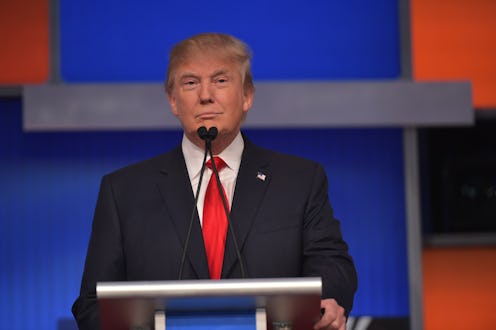News
Could Donald Trump Win As An Independent?
One of the most talked-about early moments of the GOP debate Thursday night was a big one. Right off the bat, business mogul Donald Trump confirmed that he would not support the Republican Party's nominee should he not win the primary, the only candidate to raise his hand to the affirmative when asked the question. It was an unpopular answer to be sure, with the majority of audience members booing Trump's answer loudly. But the real question hanging overhead was whether Trump could actually win the presidency as an Independent.
According to projections, a potential independent Trump candidacy would throw the GOP into chaos. An ABC News poll in July showed that six out of 10 prospective voters would not cast their ballot for Trump even if he were the official GOP nominee. If Trump were to bitterly launch his own campaign efforts beyond the borders of the traditional two-party system, it would spell disaster for the standing Republican candidate.
"That's a potential nightmare scenario for the GOP establishment," explained CNN's MJ Lee on Thursday. "A populist outsider with unlimited resources attacking their nominee from the right in the general election, raising hell — and attracting votes — with his rhetoric on issues like illegal immigration" would be devastating for Republicans looking to maintain focus.
Not only would an independent Trump steal valuable ballots, he'd likely continue to provide undesirable media fodder for comedians and rival liberal talking heads as well, aligning himself solidly as the right wing arm of the 2016 race, and funneling public perception in a fundamentalist direction, away from the majority of American voters. A Democratic nominee such as Hillary Clinton or Vermont Sen. Bernie Sanders would look wildly tame — and much more appealing — in comparison.
Trump's threat on Thursday was not exactly empty or unforeseen. In an interview with The Hill in July, Trump told reporters that he would consider running as a third-party, independent candidate if he felt unwelcome in the Republican Party.
"The RNC has not been supportive," said Trump, indicating that as a financial contributor, the GOP had been overly generous to him — a stark contrast to his treatment as a candidate. "I'll have to see how I’m being treated by the Republicans [but] I'm not in the gang," he said. Trump added that he wasn't interested in what was good "for the special interest groups", but rather, what was good for the American people.
Whether Trump remains true to his word and launches an independent campaign separate from the GOP, or whether he himself becomes the official Republican nominee, is anyone's guess — but if his own words are any indication, Trump is likely here to stay, regardless of what happens next.
